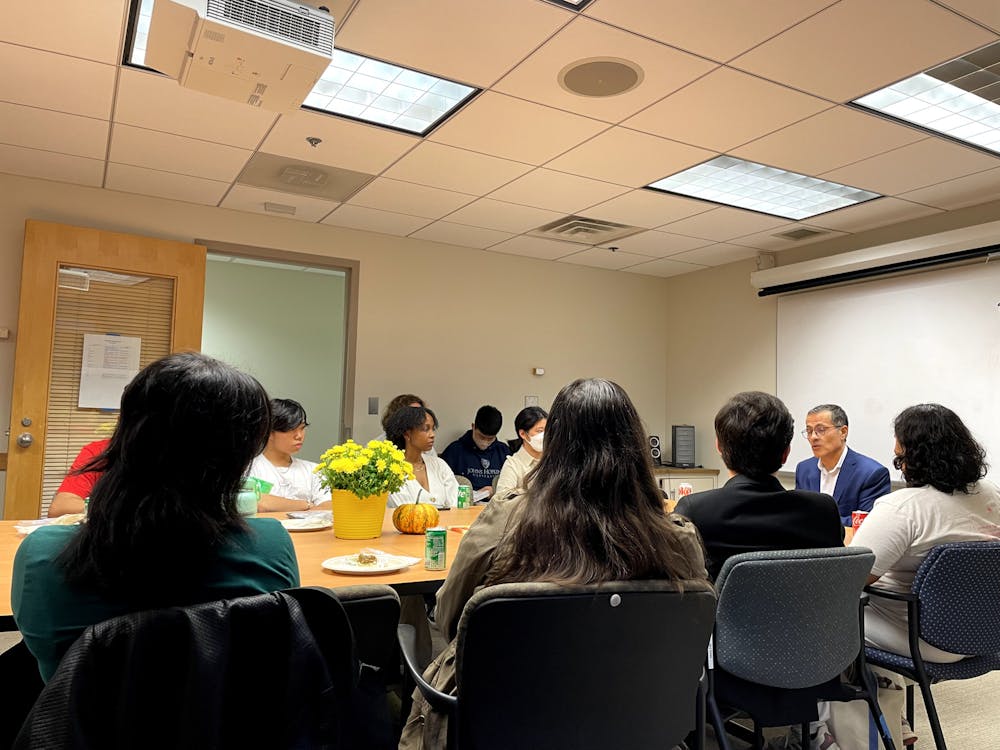The Program in International Studies hosted Vali Nasr to talk about the future of Iran’s nuclear deal on Oct. 25. Nasr is the Majid Khadduri Professor of International Affairs and Middle East Studies at the School of Advanced International Studies (SAIS).
Nasr began his talk by focusing on the history of the nuclear deal through presidents George W. Bush, Barack Obama and Donald Trump. He cited Iran’s claims that they needed a nuclear program to address energy levels and develop isotopes for cancer patients, among a host of other purposes, most of which were disputed in the West. In 2003, representatives from several countries reached a deal with Iran to stop the nuclear program in exchange for sanctions relief.
By the time of former President Obama’s presidency, worry about Iran’s growing nuclear program had increased. Nasr emphasized that Obama’s philosophy of dealing with countries like Iran was to get out of a crisis by talking.
“His answer was not that ‘I'm going to go bomb Iran,‘ but rather ‘I'm going to negotiate such that this is no longer a problem,‘“ he said.
He explained that the dynamics of diplomacy in negotiations mean that countries cannot negotiate everything they want. Hence in 2011, a secret meeting took place between the current head of the Central Intelligence Agency William Burns, the current National Security Adviser Jake Sullivan and two Iranian interlocutors.
“They made an agreement, which would become politically problematic later on. One is that they can only talk about Iran's nuclear program,“ he said. “They will not talk about Hezbollah; they will not talk about domestic Iranian issues. They will not talk about Iran's regional role. Secondly, that the deal would not be for Iran to abandon its nuclear program completely but to accept a period of severe restrictions on it that still had to be negotiated.”
After negotiations between the P5+1 (the five permanent members of the National Security Council, along with Germany) and Iran, they arrived at a deal to limit the amount of nuclear activity Iran could do for 10 years. The U.S. also agreed to lift a set of sanctions on Iran, opening the nation up to trade, in return.
However, President Trump’s administration withdrew from the deal, and Iran decided to remain in compliance. Nasr maintained that this move put the U.S.’s credibility to sign a deal with another country at stake.
“If you sign a deal with countries like Iran, they put on the table things that take many years to produce, a lot of national resources to build. [The U.S.] gives a piece of paper which is sanctions. The [U.S.] did not actually put anything in the deal that really cost anything in a real way,” he said. “The next country will say that it's too easy for the [U.S.] to go back. It was a credibility issue for the U.S., and it's still a credibility issue for the U.S., the idea that one president can basically undo what another president did.”
By the time President Biden took office, Iran had restarted its nuclear program, though still within the bounds of the deal, and had amassed a huge amount of low-enriched uranium. Nasr discussed how the previous deal’s end has led to Iranian hesitancy to enter another.
“President Biden eventually started a negotiation with Iran through the European Union to re-establish the nuclear deal, but the Iranians have wavered on signing,“ he said. “There's a real debate in Iran that ‘if we sign, how do we know they're not going to leave again? We need even more for signing this.’ So as a result this deal has been sitting on the table.”
After his talk, Nasr fielded questions from the floor.
In response to a question on how recent protests in Iran could impact the possibility of signing the nuclear deal, Nasr said that the protests have been a significant blow to the legitimacy of the government's sense of stability and the elite’s assumptions that the nation could still function while under massive sanctions.
He also expanded on his views on whether the nuclear deal can be renewed.
“The lesson of Iran is that it's not as simple as [one country] puts sanctions and then [they] lift them and the other side automatically comes on board. We have not been able to restore the nuclear deal of 2015, and we may not be able to, the way that things are going,” he said. “And if it doesn't happen, then the issue on the table is what happens to Iran's nuclear program. How are we going to manage that?”
In an interview with The News-Letter, sophomore Stephanie Njeri, a member of the events committee on the International Studies Leadership Council (ISLC), explained why the talk was important.
“In general with topics around the Middle East, people tend to think it’s too complex to even try and learn about,” she said. “[This talk] gave a good general overview with someone who is very well versed in the topic and was able to talk about the different layers of the issue, without listeners needing any previous context.”
Sophomore Gabriella Martinez, a student in Nasr’s course ‘The Politics and International Relations of Iran’ who attended the event, shared that she realized the importance of trust in the Iran nuclear deal in an email to The News-Letter.
“For any deal to be taken seriously, both sides must feel that the other is adhering to the rules and regulations, and that can only be accomplished with great trust,“ she wrote. “This would mean both Iran and the [U.S.] may need to make concessions for the greater good.”





